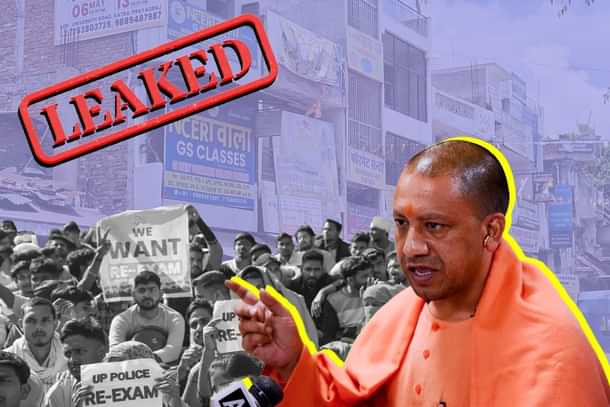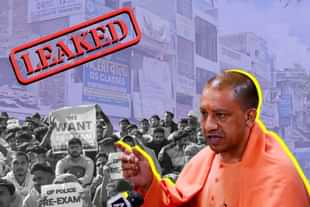Ground Reports
‘Exploiting Desperation, Uncertainty, Mass Demand’ — How ‘Solver Gangs’ In Uttar Pradesh Rig Recruitment Exams
Swarajya Staff
Jul 26, 2024, 11:38 AM | Updated 11:38 AM IST
Save & read from anywhere!
Bookmark stories for easy access on any device or the Swarajya app.


While the authorities crack down on agencies and individuals involved in examination leaks at both the central and state levels, the current situation highlights the widespread network of solver gangs operating across states.
During Swarajya’s visit to Uttar Pradesh (UP) to understand the irregularities in exams, students and teachers shared their view on the modus operandi of this mafia, or 'solver gangs’ — emphasising how deeply these networks are spread within the system.
These networks employ various methods, including distributing question papers, altering solved answer sheets, arranging proxy students, and orchestrating mass cheating in remote centres.
The nexus comprises agents from departments, private exam agencies, former exam aspirants, and institute teachers, according to teachers in Prayagraj, UP.
Prayagraj remains a hub for lakhs of students from rural and low-income backgrounds in the state. Students go there to take various clerical and entry-level exams, such as those for the selection of police constables, review officers, assistants, junior engineers, teachers, and nurses.
Unfortunately, these exams are notoriously irregular. Only this year, issues were reported in the reserve officer (RO/ARO) and UP police constable exams — conducted for 60,000 vacancies after a six-year hiatus.
Nine individuals, including five members of a solver gang preparing to rig the UP police constable recruitment exam, were arrested in the ‘coaching hub’ of the state.
To try and break the nexus down, the UP government plans to introduce new laws to prevent paper leaks and control ‘solver gangs’.
The proposed legislation includes severe penalties for those involved in paper leaks and exam manipulation, with provisions for heavy fines, bulldozer action, and imprisonment.
Teachers Calls Out The Nexus In UP
Even after several attempts to crack down on these unfair practices, exam paper leaks and its agents have persisted in UP for over three decades.
What's fuelling the issue is the high demand for government recruitment among youth, particularly from rural areas.
The problem has gone from affecting high school exams to university and recruitment exams.
The individuals involved in exam leaks have been part of the system for years, say some who work at the older coaching institutes in the city.
“This nexus has continued to spread its influence even among new agencies. While the government creates new departments to reform examinations, the problems remain, as there is no consideration on changing the network of officials,” they add.
In addition to those within the system, the solver gangs operating on the ground include many previous aspirants and new institutes that are under pressure to convert mass admissions into results.
“While earlier institutes in Prayagraj used to take 40-50 students per batch to ensure proper preparation, maintaining a reputation for quality education, many new institutes have emerged, employing teachers from other cities, enrolling 4,000-5,000 students in classes.”
“Trusting all of them becomes challenging, especially since their selling point is producing maximum results,” another veteran teacher tells Swarajya.
Further, since these exams do not occur regularly, they create significant demand and opportunities for the exam mafia to profit whenever they do occur.
Modus Operandi
While aspirants preparing for various exams in the cities say they have never been approached by anyone from these gangs, it is a different story in the villages.
"It is mostly back in the villages where they approach the youth," one student tells Swarajya. “Agents are tasked with luring more and more people from different regions, particularly remote areas. In villages, they meet candidates and their parents to convince them.”
"Since these exams come after many years, parents and families also get convinced with paying smaller amounts, given there is only one chance," he adds.
Youth who wait for years for exam notifications and often see government jobs as their only employment option fall prey to these networks. They face pressure from mounting debts, age limits, and the uncertainty of when the next opportunity will arise.
"The (gangs') convincing method is straightforward: very few vacancies come every few years, age remains an issue, there is uncertainty about when the next opportunity will come, and unemployment," an aspirant explains.
“This happens in our village as well. It is common for lower-level examinations, where the youth sitting idle, with not much intention and means for preparation, are promised question papers and solutions a week before."
"We found out that the paper got leaked once because my friend and I came to Prayagraj to prepare. However, there were kids my age in the village who did not prepare but applied for the exam. Many of them were above the cut-off, which made it clear that the paper was leaked," she added.
However, for students who are preparing in the city, that too with a very limited budget, it is difficult to entertain these agents. The environment is also very different, with many students who are serious about their preparations.
"But, I am sure that even in cities, many fall prey as their age increases. For bigger exams, there is more money involved, more educated people, and big names in cities. For them, there are also cases of sending someone else with fake identities," she adds.
The problem in all cases remains the same — since no strict action is taken even if the exam is cancelled or students are caught, there is not much to lose for the agents, nor for the families.
However, if the gangs do succeed, they make substantial money, thanks to the massive demand. Even charging very little money from each family would suffice.
Families under pressure from a lack of economic opportunities, uncertainty about vacancies, and the allure of government employment, often resort to these irregular means to succeed in exams. Many believe that's their only chance to succeed.





